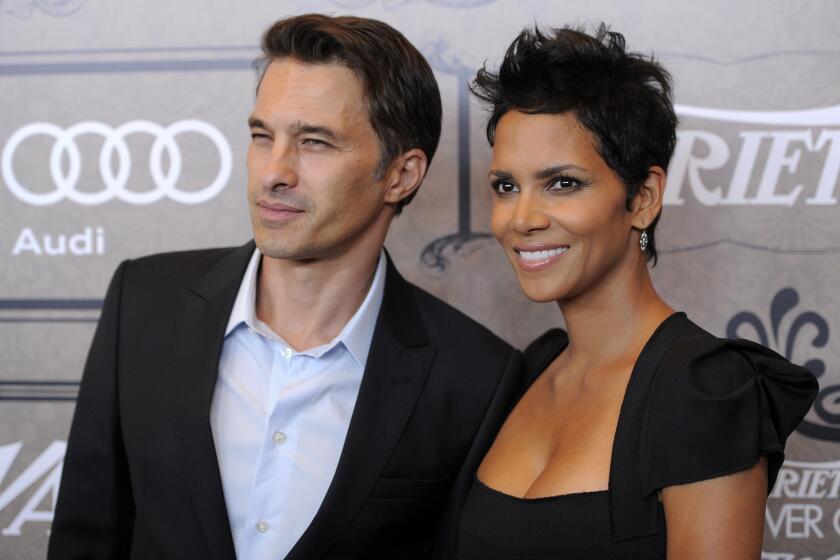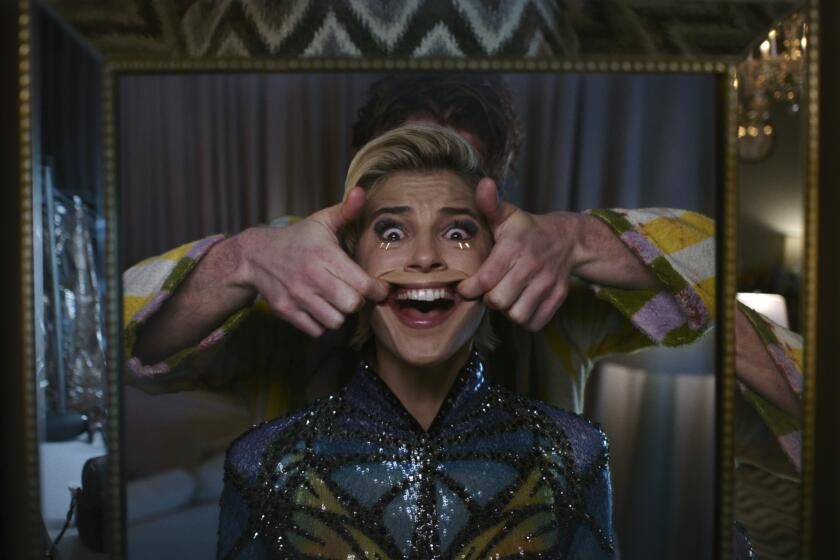‘Chi-Raq’: Spike Lee tries to change the gun debate, with comedy and anatomy
Reporting from NEW YORK — Shortly before the premiere of Spike Lee’s “Chi-Raq,” a new satire-melodrama about gun violence and a subgenre all its own, the activist Al Sharpton stood up to address the audience.
“A lot of people always cause controversy when Spike comes out with something,” Sharpton said on Tuesday night at the Ziegfeld Theatre here, introducing a film that issues a unique type of warning about the availability of guns. “And then you know it’s right.”
Less than 24 hours later those words would prove prescient as multiple shooters opened fire in the Inland Regional Center in San Bernadino, killing 14 and wounding 21, because of guns apparently bought legally. The movie couldn’t have asked for a more painful reminder of its message.
SIGN UP for the free Indie Focus movies newsletter >>
Lee has a lot on his mind in “Chi-Raq,” which opens in about 300 theaters Friday before debuting on Amazon two months later. Set in the part of Chicago’s Southside where thousands of innocent people have been killed by stray bullets — more Americans in the past 15 years than Iraq or Afghanistan, a title sequence states — it moves among gang members, victims, community leaders, politicians and variety of colorful local figures.
At times trenchant and at times silly, “Chi-Raq”--inspired by Aristophanes’ “Lysistrata”--follows that piece’s conceit of young women withholding sex for as long as men continue brandishing their weapons. “No peace, no...,” their chant goes in the film, as protesters use an alliterative synonym for a part of the female anatomy. The women literally put their private parts in lockdown, zipping up chastity outfits (if not much else) and saying the boycott will remain until the guns are put down. A global movement is soon sparked.
The movie uses a rhyming scheme, often to blue effect. “Do your duty and give up that booty” and “if they should have you lie on the conjugal couch/don’t unlock the nappy pouch,” are among the more tame verses. Its tone is both original and wildly all over the road.
“Chi-Raq’s” thrust, as it were, is about how the gun has become more fetishized than ideals such as morals or education. The film’s main social points are delivered in a powerful if overly declamatory speech by John Cusack’s character midway through. The actor plays a preacher whose church sits deep in the heart of gang territory, and in the scene he is shown giving a nearly 15-minute sermon railing against institutional racism, the NRA, gangs, white indifference, witness cowardice and a host of other ills. Given recent events in chicago, it’s worth noting that police are not a main antagonist in the film, though Samuel L. Jackson, as a kind of free-floating omniscient narrator, offers a pointed condemnation.
The screening elicited a strong reaction, with several midscreening applause moments. Then it gave way to a rally. Hundreds filed out of the Ziegfeld and donned orange knit caps, using the symbolic color opposing gun violence. They walked several blocks in the rain down the middle of Broadway to a podium in Times Square, where Lee, Sharpton, the film’s star Nick Canon, and a number of victims’ relatives spoke, including Lucia McBath, the mother of gunned-down teenager Jordan Davis.
“I wish my son could have been here tonight. He would have loved to be part of all this,” she said “Join me in turning anguish into action.”
George Wilborn, a comic and performer who has a small part in the movie, took the stage. “I’m playing with house money. I’m 49. And I was not supposed to make it off 85th and Aberdeen,” he said, citing a rough stretch of Chicago’s South Side. I was never supposed to see any of the countries I saw. And I was certainly not supposed to be standing up here with the people I’m standing with.” He urged people who witnessed gun violence to step forward with testimony. “After the film is the fight,” he said, as pro-gun control chants sprung up from the crowd.
Will one follow the other? First there’s the matter of people seeing the movie; Lee’s recent efforts, after all, have been far from commercial. And the idea of a theatrical window preceding an Amazon one — a far cry form Netflix’s day-and-date model — is a novel but untested one.
“Chi-Raq” is unlikely to change people’s minds about gun control, just as it’s unlikely to change people’s minds about Spike Lee. The film has its share of rhetorical inconsistencies too, often too closely conflating the gun control debate with minority disenfranchisement. But filmmakers may have a point when they argue that the medium can convey the message differently. A movie that nods to sources as diverse as “Next Friday,” Greek tragedy and Mel Brooks may open up the audience in a way that — or news coverage — cannot. “[It’s a movie] that’s already the world and changed things for the better,” said Amazon Studios chief Ted Hope.
The timeliness, at least, won’t go away soon. Earlier that day, Chicago Mayor Rahm Emanuel had fired the city’s police superintendent after harsh criticism about the handling of the Laquan McDonald killing, and the movie’s scenes of scrambling Chicago officials took on an eerie cast. Actor Harry Lennix, who plays a Chicago politician, told the audience at the rally: “You may have heard today what’s going on. But that’s just the start,” he said. “When politics fail, that’s when art can step in.”
Lee then led the crowd in a “We Love Chicago” chant. “We got to let Chicago know we love them and support them,” he said, Sharpton added, “Even as we laugh we laugh through our tears, we find entertainment through our pain. Good night and stop the violence,” he said, as people on the stage hugged.
You might also like:
San Bernadino Shooting: Live Updates
In 3 ½ Minutes, an eerie prefiguring of the Charleston shooting
Two police killings of young men, and how two cities responded
More to Read
Only good movies
Get the Indie Focus newsletter, Mark Olsen's weekly guide to the world of cinema.
You may occasionally receive promotional content from the Los Angeles Times.











